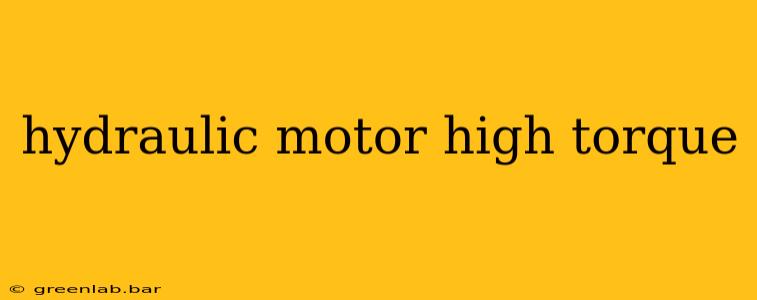Hydraulic motors are known for their exceptional power-to-size ratio and ability to deliver high torque, even at low speeds. This makes them ideal for a wide range of applications requiring significant rotational force, from heavy machinery to intricate robotic systems. This article delves into the world of high-torque hydraulic motors, exploring their functionalities, applications, and key considerations for selecting the right motor for your specific needs.
Understanding High Torque in Hydraulic Motors
Torque, in simple terms, is the rotational force applied to an object. A high-torque hydraulic motor generates a substantial twisting force, capable of driving heavy loads or overcoming significant resistance. This high torque output is achieved through several design features and operational principles:
Key Design Elements Contributing to High Torque:
-
Larger Displacement: Hydraulic motors with larger displacements generally produce higher torque. Displacement refers to the volume of fluid the motor displaces per revolution. A larger displacement means more fluid is moved per rotation, leading to increased power and torque.
-
Gear Design: Gear motors are particularly well-suited for high-torque applications. The robust gear geometry allows for efficient transmission of hydraulic power into rotational force. Specific gear designs, like those with larger gear teeth or specialized tooth profiles, are optimized for maximum torque output.
-
Vane and Piston Configurations: Vane and piston motors also offer high torque capabilities, although their design characteristics and torque curves can differ from gear motors. Piston motors, for instance, are often preferred in applications demanding extremely high torque and precision.
-
Motor Construction Materials: The materials used in the motor's construction impact its durability and ability to withstand high torques. High-strength materials are crucial for preventing damage under heavy loads.
Applications Demanding High-Torque Hydraulic Motors
The exceptional torque output of these motors makes them indispensable in a multitude of industries and applications:
Heavy Machinery & Construction:
- Excavators: High-torque motors power the digging and lifting mechanisms of excavators, enabling them to handle heavy loads and demanding digging conditions.
- Bulldozers: The powerful blade operation of bulldozers relies on hydraulic motors delivering consistent, high torque.
- Crawler Cranes: The precise and forceful movements of crawler cranes benefit greatly from the torque capabilities of hydraulic motors.
- Road construction equipment: Applications such as asphalt pavers and compaction rollers need the dependable high torque of hydraulic motors to maintain their operations.
Industrial Automation & Robotics:
- Heavy-duty robotic arms: Precise and powerful manipulation of heavy components in industrial settings requires high-torque hydraulic motors for smooth and controlled movement.
- Conveyor systems: Moving heavy materials along conveyor belts requires high torque to maintain reliable operation.
- Presses and stamping machines: These machines often require extremely high torque to perform their tasks.
Marine & Offshore:
- Ship steering systems: Hydraulic motors contribute to efficient and precise steering in large vessels.
- Subsea applications: The demanding environments of subsea operations require hydraulic motors capable of enduring high pressure and delivering consistent high torque.
Agricultural Machinery:
- Tractors and harvesters: Powerful operations requiring high torque to facilitate efficient agricultural processes.
Factors to Consider When Selecting a High-Torque Hydraulic Motor
Choosing the right motor involves careful consideration of several factors:
-
Required Torque: Accurately determining the necessary torque output for your application is paramount. Underestimating this requirement can lead to motor overload and failure.
-
Operating Pressure: The hydraulic system's operating pressure influences the motor's performance. Higher pressure can lead to greater torque output.
-
Speed Requirements: The desired speed of rotation needs to be considered in tandem with the torque requirement. High torque often comes with lower speeds, and vice versa.
-
Efficiency: Opting for a highly efficient motor minimizes energy consumption and operational costs.
-
Environmental Considerations: The motor's suitability for the operating environment (temperature, humidity, etc.) should be evaluated.
-
Maintenance: The motor's ease of maintenance and lifespan should be factored into the decision.
By carefully considering these factors, you can select a high-torque hydraulic motor that meets your specific application requirements and ensures optimal performance and longevity. The right choice ensures efficient and reliable operation, reducing downtime and maximizing your return on investment.

